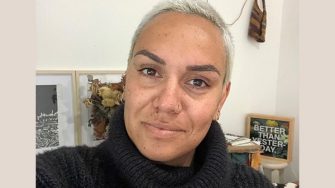
UNSW School of Population Health welcomes Nellie Pollard-Wharton, a Kooma woman, mother and social worker, as Associate Lecturer in Aboriginal and Torres Strait Islander health. Nellie Pollard-Wharton, whose research is focused on co-design within Aboriginal health, is passionate about community- driven and -led initiatives to address specific challenges and contribute to the overall health and wellbeing of Aboriginal and Torres Strait Islander people, families, and communities. Together with Coral Lever, Nellie is also co-founder of First Nations COVID-19 Response, a grassroots initiative in Sydney delivering pre-cooked meals, groceries and emergency support to First Nations people and families in isolation during lockdown and spends most days of the week volunteering. In early December, Nellie won the 2021 Indigenous Allied Health Australia Local Allied Health Champion Award
Contributing meaningfully to Aboriginal and Torres Strait Islander health research and education cannot be done without transparent and meaningful collaborations with Aboriginal and Torres Strait Islander people and communities, says Ms Pollard-Wharton.
“As an undergraduate student, I established a long-term association with Indigenous Allied Health Australia (IAHA), which has motivated my commitment to the importance of growing Blak leadership within Aboriginal health research and education, and Blak voices within the academy,” says Ms Pollard-Wharton.
“I believe that as a Kooma woman and a social worker I bring a unique and important perspective not only to my role, but also to the School and the Faculty,” said Ms Pollard-Wharton. “Contributing meaningfully to Aboriginal and Torres Strait Islander health research and education cannot be done without the transparent and meaningful collaborations with Aboriginal and Torres Strait Islander people and communities.”
As part of her new role as Associate Lecturer, Ms Pollard-Wharton is looking forward to developing her teaching approach, contributing to research across the School and continuing her research in co-design in Aboriginal health in 2023.
“Whilst co-design is a term that is used in various fields it is being increasingly used in Aboriginal spaces to denote collaboration,” she said. “I want to understand what this looks like in reality, is it authentic, and is it measurable?”
Associate Professor Faye McMillan AM from UNSW School of Population Health said: “I am excited to continue the relationship that was nurtured with Nellie through our roles at IAHA, and to share a journey within UNSW that has the potential to transform the inclusion and participation of Aboriginal and Torres Strait Islander Peoples in meaningful and Yindyamarra (respectful) Sovereign relationships.”
Professor Rebecca Ivers, Head of UNSW School of Population Health said: “Nellie brings a strong and unique perspective to research and teaching in the School and adds to our Aboriginal and Torres Strait Islander health team. There is also much we can learn from her impact, innovation and leadership as co-Founder of First Nations Covid-19 Response.”
In the wake of the global pandemic in March 2020, Nellie Pollard-Wharton and Coral Lever established First Nations Covid-19 Response on social media to create an online space for mutual support, connection and care amongst Aboriginal and Torres Strait Islander peoples in Sydney’s Inner West and Eastern Suburbs.
Food insecurity was becoming more apparent and gaps that existed before the pandemic were further widened during the lockdown, says Ms Pollard-Wharton.
“We started out committed to listening to local needs to shape our response and support our community to navigate these challenging and stressful times,” said Ms Pollard-Wharton. “Currently we are consulting with our local community, Elders and advocates to create a First Nations-led sustainable food environment.”
“Our belief is that food is a right, not a privilege, everyone deserves to have the healthy food they need but many won’t ask for help because of stigma and shame and we aim to provide culturally appropriate food relief in a dignified way, she said. “People who live below the poverty line should still have access to fresh, high-quality food because income should not determine a person's autonomy in their food choice.”
We know that food insecurity existed pre-covid and will continue after, and community-led efforts open the door to judgemental free support, says Ms Pollard-Wharton.
“For Aboriginal peoples supporting one-another is second nature - we know what we need and the best ways in which to reach out to our communities with the appropriate guidance, ensuring that support does not come with risks is imperative, especially during COVID-19,” she said.
“Asking for support should not mean that you as a family, person or community needs to be monitored, especially by police or child services - the fear of government intervention is a very real and well-documented issue faced by Aboriginal and Torres Strait Islander peoples - in order to combat this, we need the support to access the appropriate pathways to continue to care for our communities our way.”
Nellie Pollard-Wharton extends a special thanks to the collective of community donors and volunteers who made it possible to provide support immediate and effective relief in the form of groceries, gift cards, meals and household goods, partnerships with the Tin Humpy Cafe Redfern and Plate it Forward, who provided quality nutritious meals to the most vulnerable community members, and City of Sydney and Inner West Councils.
Contact Name :
UNSW School of Population Health
